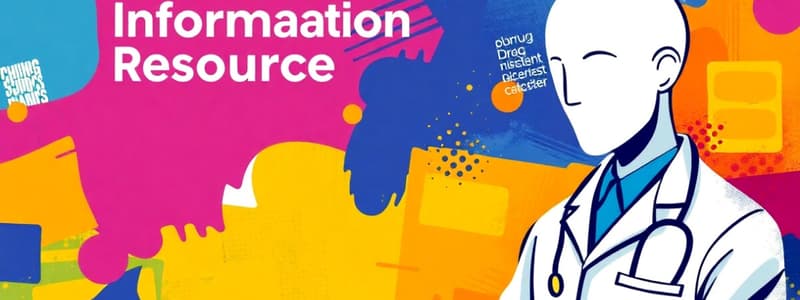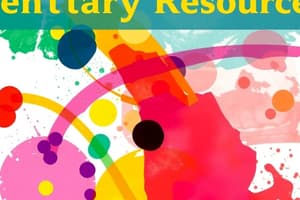Podcast
Questions and Answers
Which type of resource is best suited for quickly familiarizing a practitioner with general information on a topic?
Which type of resource is best suited for quickly familiarizing a practitioner with general information on a topic?
- Secondary
- Primary
- Tertiary (correct)
- Quaternary
When might a secondary resource be most useful?
When might a secondary resource be most useful?
- When the available tertiary resources lack recent or comprehensive information. (correct)
- When a quick overview of a topic is needed.
- When seeking information on very rare diseases or conditions.
- When detailed, current clinical trial data is required.
Which type of literature provides the most recent and in-depth information?
Which type of literature provides the most recent and in-depth information?
- Grey literature
- Secondary literature
- Primary literature (correct)
- Tertiary literature
A requestor is seeking detailed information about the management of a specific disease state. Which type of resource is most appropriate?
A requestor is seeking detailed information about the management of a specific disease state. Which type of resource is most appropriate?
What is a key characteristic of tertiary resources?
What is a key characteristic of tertiary resources?
What is a potential problem associated with using tertiary resources?
What is a potential problem associated with using tertiary resources?
Which of the following is an example of a tertiary resource?
Which of the following is an example of a tertiary resource?
Which of the following is a function of secondary resources?
Which of the following is a function of secondary resources?
Why is it important to use a variety of search terms when using secondary resources?
Why is it important to use a variety of search terms when using secondary resources?
What is the function of the Boolean operator 'AND' in a database search?
What is the function of the Boolean operator 'AND' in a database search?
What is the purpose of the Boolean operator 'NOT' in a database search?
What is the purpose of the Boolean operator 'NOT' in a database search?
What is a key advantage of using primary literature?
What is a key advantage of using primary literature?
What is a key disadvantage of using primary literature resources?
What is a key disadvantage of using primary literature resources?
Which database is most suitable for finding open-access journal publications and articles?
Which database is most suitable for finding open-access journal publications and articles?
Besides boolean operators, what other functionality does PubMed offer to refine a search?
Besides boolean operators, what other functionality does PubMed offer to refine a search?
What should be carefully evaluated on internet resources?
What should be carefully evaluated on internet resources?
What is a characteristic of internet sites maintained by educational institutions or government divisions?
What is a characteristic of internet sites maintained by educational institutions or government divisions?
When seeking information about a specific drug therapy, which of the following is the best approach?
When seeking information about a specific drug therapy, which of the following is the best approach?
Which of the following criteria is most important when evaluating the quality of an online resource?
Which of the following criteria is most important when evaluating the quality of an online resource?
If a pharmacist is asked a question about the mechanism of action of a drug, which type of resource would most likely contain the answer?
If a pharmacist is asked a question about the mechanism of action of a drug, which type of resource would most likely contain the answer?
When answering a drug information request, which of these considerations is LEAST important?
When answering a drug information request, which of these considerations is LEAST important?
What is the key difference between indexing and abstracting services in secondary resources?
What is the key difference between indexing and abstracting services in secondary resources?
A pharmacist needs to identify the inactive ingredients of a medication. Which resource would be most appropriate to consult first?
A pharmacist needs to identify the inactive ingredients of a medication. Which resource would be most appropriate to consult first?
A healthcare provider is looking for information on off-label uses of a particular medication in a specific pediatric population. What is the MOST appropriate type of resource to consult?
A healthcare provider is looking for information on off-label uses of a particular medication in a specific pediatric population. What is the MOST appropriate type of resource to consult?
You're investigating a potential drug interaction, but initial searches in tertiary resources are yielding conflicting information, and you suspect publication bias. Which is the next best step?
You're investigating a potential drug interaction, but initial searches in tertiary resources are yielding conflicting information, and you suspect publication bias. Which is the next best step?
A patient asks about the risk of a very rare side effect associated with a new medication they've been prescribed. Standard tertiary resources don't mention it. What is a logical next step?
A patient asks about the risk of a very rare side effect associated with a new medication they've been prescribed. Standard tertiary resources don't mention it. What is a logical next step?
A recently published meta-analysis suggests a potential link between a widely used medication and a rare form of cancer. Your supervising pharmacist asks you to critically evaluate the meta-analysis itself. What is your BEST course of action?
A recently published meta-analysis suggests a potential link between a widely used medication and a rare form of cancer. Your supervising pharmacist asks you to critically evaluate the meta-analysis itself. What is your BEST course of action?
Which of the following search strategies is most effective when using PubMed to find articles that discuss both 'anxiety' and 'insomnia', but not 'depression'?
Which of the following search strategies is most effective when using PubMed to find articles that discuss both 'anxiety' and 'insomnia', but not 'depression'?
A researcher is designing a clinical trial on a novel drug target. They need to find existing research, but want to greatly restrict results to only randomized controlled trials published in the last 5 years. What is the MOST efficient approach in PubMed?
A researcher is designing a clinical trial on a novel drug target. They need to find existing research, but want to greatly restrict results to only randomized controlled trials published in the last 5 years. What is the MOST efficient approach in PubMed?
A new study suggests a potential interaction between a common herbal supplement and an anticoagulant drug. To best explain this risk to a patient, what type of resource should you consult?
A new study suggests a potential interaction between a common herbal supplement and an anticoagulant drug. To best explain this risk to a patient, what type of resource should you consult?
You are tasked with educating patients on the appropriate use and potential side effects of over-the-counter medications. Which resources would be BEST to simplify the information for patient understanding?
You are tasked with educating patients on the appropriate use and potential side effects of over-the-counter medications. Which resources would be BEST to simplify the information for patient understanding?
A pharmacist wants to stay current with new drug approvals, withdrawals, and significant labeling changes. What is the MOST efficient method?
A pharmacist wants to stay current with new drug approvals, withdrawals, and significant labeling changes. What is the MOST efficient method?
Flashcards
What are Tertiary Resources?
What are Tertiary Resources?
Resources like textbooks, full-text databases and review articles providing summarized information.
What are Secondary Resources?
What are Secondary Resources?
Indexing or abstracting services that direct users to primary literature.
What is Primary Literature?
What is Primary Literature?
Clinical studies or research providing the most recent in-depth information.
What are problems of Tertiary Resources?
What are problems of Tertiary Resources?
Signup and view all the flashcards
What is Indexing?
What is Indexing?
Signup and view all the flashcards
What is Abstracting?
What is Abstracting?
Signup and view all the flashcards
What does the Boolean operator AND do?
What does the Boolean operator AND do?
Signup and view all the flashcards
What does the Boolean operator OR do?
What does the Boolean operator OR do?
Signup and view all the flashcards
What does the Boolean operator NOT do?
What does the Boolean operator NOT do?
Signup and view all the flashcards
What does primary literature consist of?
What does primary literature consist of?
Signup and view all the flashcards
What are the advantages of Primary Resources?
What are the advantages of Primary Resources?
Signup and view all the flashcards
What are the disadvantages of Primary Resources?
What are the disadvantages of Primary Resources?
Signup and view all the flashcards
Study Notes
Introduction
- Pharmacists need to respond to drug information requests daily.
- Pharmacists can choose the easiest and most familiar information resources.
- The resource used to respond to a question depends on the requestor type.
- Consumer/patient requests should be answered using tertiary resources.
- Prescriber requests for disease state management details should be answered using primary literature.
- The best method to find information should include a stepwise approach.
Information Resource Types
- Tertiary resources are review articles, textbooks, and full-text databases.
- Secondary resources are indexing or abstracting services.
- Primary resources are clinical studies.
- Tertiary resources provide general information to familiarize practitioners with a topic.
- Secondary resources are useful when tertiary information is not recent or comprehensive enough.
- Secondary databases guide readers to primary literature for more insight on a topic.
- Primary literature offers current and in-depth information about a topic.
- Analyzing and critiquing study methodology is possible using primary literature to determine conclusion validity.
- Primary resources serve as information source for secondary and tertiary resources
- Consult news reports or internet sites to get background information before searching.
- Other resources such as experts in particular practice areas may be consulted.
- Information search does not always require all three types of resources.
- Commercial availability of a product formulation can be found using tertiary literature.
- Mechanism of action can be found using tertiary resources.
- Clinical trials supporting off-label use in a specific population can be found using primary literature.
Tertiary Resources
- Tertiary resources consist of information which has been summarized by an editor or author to make a quick and easy summary of a topic.
- Examples: textbooks, compendia, review articles, and general internet information.
- Problems: Errors in transcription, human bias, incorrect interpretation of information, and lack of expertise by authors
- A tertiary resource is an initial place to identify information.
- Tertiary resources are convenient, easy to use, and familiar to most practitioners.
- Most information that a practitioner needs is in these resources.
- Disadvantages: Lag time associated with publication, less current or out of date information, incomplete information, space limitations, and incomplete literature searches by the author.
Examples of Tertiary Resources
- American Society of Health-System Pharmacists (AHFS) Drug Information.
- Clinical Pharmacology
- Drugdex® System
- Drug Facts and Comparisons
- Drug Information Handbook
- Handbook of Clinical Drug Data
- Handbook of Nonprescription Drugs: An Interactive Approach to Self-Care
- Physicians' Desk Reference
- USP DI Volumes I, II, and III
- Meyler's Side Effects of Drugs
- Red Book
- American Drug Index
- Handbook on Injectable Drugs
- King Guide to Parenteral Admixtures.
- Applied Therapeutics: The Clinical Use of Drugs
- Cecil Medicine
- Harrison's Principles of Internal Medicine
- The Merck Manual of Diagnosis and Therapy
- Pharmacotherapy: A Pathophysiological Approach
- Pharmacotherapy Principles and Practice
- Textbook of Therapeutics
- Pediatrics: Harriet Lane...
- Iv admixtures: Trissel's..
Secondary Resources
- Direct users to primary literature through references that index or abstract them.
- Indexing provides bibliographic citation information (title, author, article citation).
- Abstracting includes a brief information description (or abstract) provided by the cited resource or article.
- Secondary resources are available electronically and in print.
- Systems do not index all terms the same.
- Terms a database is using is necessary to determine in order to conduct a successful search.
- Databases through the National Library of Medicine index terms by their Medical Subject Heading (MeSH term).
- Iowa Drug Information System uses the United States Adopted Name and the International Classification of Diseases.
- Variety of terms need to be utilized for search strategy for the sample question "Is clonidine effective in the treatment of attention deficit hyperactivity disorder (ADHD) in adolescents?"
- Key terms for search strategy include clonidine, ADHD, and adolescents.
- Recognize that different databases might require different search terms.
- AND: will combine two terms, returning only citations containing both of those concepts or terms.
- OR: will have an equal or greater number of returns since it will include any citation where either term is used.
- NOT: will always decrease the number of responses, since it eliminates any references having the term that follows that operator.
Examples of Secondary Databases
- Biological Abstracts/ Biosis Previews: Thompson Medical (http://www.scientific.thomson.com) -> Biological and biomedical information.
- Cancerlit: National Cancer Institute -> Oncology (http://www.cancer.gov/)
- CINAHL: CINAHL Information Systems (http://www.cinahl.com) -> Nursing and allied health.
- Cochrane Library: Cochrane Library (http://www.cochrane.org) -> Medical treatments, conditions, and alternative therapies.
- Iowa Drug Information System (IDIS): University of Iowa (http://itsnt14.its.uiowa.edu/).
- Journal Watch: Massachusetts Medical Society (http://www.jwatch.org).
- LexisNexis: LexisNexis Academic & Library Solutions (http://www.lexisnexis.com) -> Medical, legal, and business news.
- Medline: National Library of Medicine (http://www.nlm.nih.gov) -> Basic and clinical sciences as well as nursing, dentistry, veterinary medicine
- Pharmacoeconomics & Outcomes News Weekly: Adis International (http://www.adis.com).
Primary Resources
- Clinical research, basic research studies, and reports that are both published and unpublished.
- Controlled trials, cohort studies, case series, and case reports are all primary resources.
- Primary resources offer access to detailed information about a topic.
- Primary resources provide the ability to personally assess the study result validity and applicability.
- Primary resources are more recent than tertiary or secondary literature.
- Misleading conclusion can occur if only one trial is looked at without the context of other researches .
- Good skills in medical literature evaluation.
- Time needed is high to evaluate a large volume of literature available.
- PubMed links to open access journal publications & articles.
Alternative Resources
- Evaluate the quality of all information provided on Internet resources.
- Sites maintained by educational institutions, not-for-profit medical organizations, or the U.S. government division are likely to contain high quality information.
- Information maintained by a company selling or promoting a specific product is more questionable.
- Criteria should be used when determining quality of online material.
- Sources should be credible, and not have a vested interest in promoting treatment or product?
- Information, accurate, and current.
- Site links to other nonaffiliated sites.
- Information appropriately detailed and referenced.
- Possible to contact site author for additional comments or questions.
- Identify an affiliated organization with the disease state when looking for recent recommendations regarding treatment of a specific disease state.
- When seeking information about a specific drug therapy, contact product manufacturers via medical information department.
Studying That Suits You
Use AI to generate personalized quizzes and flashcards to suit your learning preferences.




